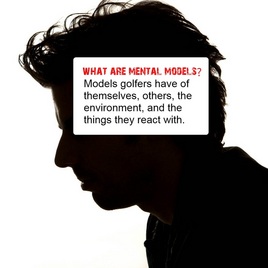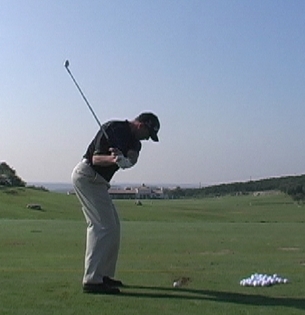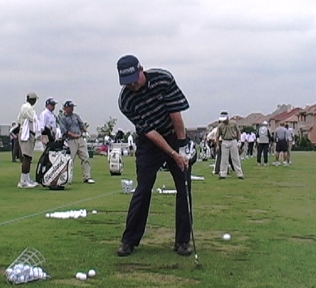 What is the difference between playing golf for fun and playing golf in a competition? Not a lot really. Many of the golfers we work with at our college struggle with the process of learning how to shoot lower-more competitive scores when they are competing. When they are relaxed and playing a sociable game with their friends they tell us that they play much better and score lower than the times when they are competing in a tournament. When professional golfers play golf on tour they are required to play four round events because they only get paid when they complete four rounds of golf successfully. The trouble is that they have to play to a very high standard every week and particularly in the first and second round. This poses somewhat of a problem for many young and inexperienced professionals because in their minds they think they need a lot of experience before they start to perform consistently for four days. I don’t agree with this. I believe that you can fast-track the “playing for experience” process by focusing your mental energy on developing effective modelling strategies that get to the heart of performing better faster.  What do I mean when I say “modelling strategies?” We build mental models or maps of all our experiences and we use these maps to get us back to places we want to be and also places we don’t want to be. That’s right; they will also take us to places we don’t want to go. For many golfers, their “competition model” takes them to places they don’t want to be i.e. higher scores, frustration and feelings of helplessness that makes it difficult for them to make cuts and win prize money whereas their non-competition model takes them to lower scores that seem easier to achieve. Basically you need to understand that there is a distinction between the times when you compete where you feel satisfied with your results and the times when you compete and you don’t.  Your map of higher scores and the feelings associated with it is something you fight to stay away from which might seem logical and sensible to you, however you need to understand that this is not about logic. There is nothing logical about not playing to your potential as no amount of logic or positive thinking will make you feel better about playing sub-standard golf. What you need to do is design a competition model that leads you to consistent lower golf scores and at the same time develops your self-image and self esteem. Think of any consistent routine as a model. The routine is an experience that you have packaged up so that you can use it again and again. "Driving the kids to school at the same time each day, along the same route is an example of a consistent routine many people execute." You have literally hundreds of routines or models of experience that you use to get through your life safely and with few mistakes. Driving the kids to school at the same time each day, along the same route is an example of a consistent routine many people execute. Think about it like this; nearly everything you do in your life is done effortlessly and seamlessly. In other words, it’s relatively easy and you make few if any mistakes. And yet the one routine you’ve spent a great deal of your life time perfecting is the one your struggle with the most. Driving your car on the other side of the road is a challenge (particularly in traffic) and yet it will seems easier to do for many golfers than stringing four consistent rounds of golf together. Why do we try so hard to do something that you can already do so well? It actually doesn’t make a lot of sense does it?  I believe that part of the reason is appreciating how the context and content of an experience influences your existing competition model. The difference in experience between two events is that the context is different and the content is different. Here’s two examples:
Now I know that this is a simplistic attempt to help you to understand that the content of your experience makes up your experience and when slightly different can lead you to different outcomes. So the question is this; Is it useful and even helpful for you to you to see it this way? Let’s look at it again: Context #1. Playing a round of golf with friends and enjoying the experience which leads to better performances and more fun Context #1. Trying to play well in a golf tournament which leads to higher scores and no fun Is there a difference between playing golf and trying to play golf? You bet there is, the difference is massive!  Remember this; you are not wrong or broken in some way. Golfers use the word ‘fix’ often when describing some aspect their performance that is not up to par. The word fix implies broken or in need of repair, but you are not broken, you are carrying out your current strategies perfectly, however it’s just possible that your strategies (which form the content of your model) may be poorly designed and ineffective. Golfers who are currently performing more the way you want to in a golf tournament are more than likely using more effective and useful strategies built around well constructed models that define the context and content of the experience they’re striving for, and which can be repeated consistently because they have developed a clearly defined map which is harmonious with their future goals. When you build a competition model that taps into the golf skills and potential you already possess, you will start to perform more the way you want to. The paradigm of playing as much golf as possible to get better is not a useful strategy unless you develop your strategy with content that taps into your existing skills and golfing experience.
Remember that you have all the resources you need already to play golf the way you truly want to. So build a better map of the experience you wish to have by carefully adding content to it that will lead you to lower golf scores, better results in tournaments and ultimately a lot more fun. It’s not impossible because there are plenty of golfers already doing it the way you want to, so take a leaf from their experience and add it to yours. Do it today, do it now, and get on with playing golf in competition just the way you want to play it. Lawrie Montague and David Milne Your Success On Tour is Our Business Comments are closed.
|
Archives
June 2019
|
Proudly Supported By
Copyright © 2011 - 2018 Pro Tour Golf College
Website Managed By Golf Performance Media
All Rights Reserved
Website Managed By Golf Performance Media
All Rights Reserved

 RSS Feed
RSS Feed



